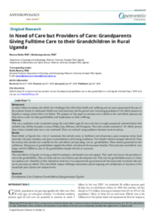Abstract
Background
In most African countries, the elderly face challenges that affect their health and wellbeing and are more pronounced because of the systemic factors of inadequate health care, food insecurity and the general care. Increasing population of the elderly persons in Uganda is raising concern than ever before. The purpose of this paper is to ascertain care available to the rural elderly persons and their role as carers for their grandchildren and implications on their wellbeing.
Methods
This was a qualitative study conducted among the rural elderly aged 60 years and above in eight purposively selected district that included Lira, Nebbi, Kampala, Luwero, Pallisa, Jinja, Mbarara, and Ntungamo. The study sample consisted of 101 elderly person from whom in-depth interviews were conducted. Data was analysed using qualitative thematic content analysis.
Results
Rural elderly in Uganda face a lot of constraints that include access to healthcare and information, poor economic status, food insecurity and poor nutrition, and poor accommodation and housing conditions. Two broader themes emerged inductively from the analysis that include care available for the rural elderly and providing care to grandchildren. These themes generated several subthemes. Taking care of grandchildren crippled the elderly and reduced the economic benefits. That said some rural elderly were happy and felt fulfilled to care of the grandchildren despite the lack of resources.
Conclusion
The rural elderly in Uganda are living in doleful conditions with limited care and support. They need care but are the providers of care to the grandchildren. They are frails and may not afford to provide adequate care. They care for grandchildren many of whom are orphans and vulnerable yet they themselves need care. It is important the government and the community re-enforce this care not to put strain on elderly. The rural elderly unique challenges necessitates special targeting and mobilization of resources at the household, local, district and national levels.

